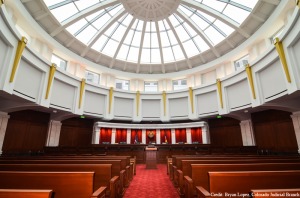When it comes to sabotaging TABOR, term limits and the initiative process, the usual suspects tend to round themselves up.
The latest group, called “Building a Better Colorado,” is fronted by the otherwise estimable Dan Ritchie, who served 15 years as chancellor of the University of Denver, taking no pay and donating his $50 million ranch to the school.
The organization intends to hold “town hall meetings” throughout the state and produce a report recommending changes by year’s end.
Presumably most of these changes would necessitate ballot initiatives, since it’s hard to get the two-thirds majorities needed in the legislature to place referendums.

By proposing initiatives they are going to have to confront the awkward single-subject rule. More on that later.
Despite the clarity of their goals, the reformers like to talk in tiptoe-through-the-tulips terms. “It is subtle,” Gail Klapper of the Colorado Forum told The Denver Post, adding the discussions are about “nuanced changes” allowing Colorado “to move forward in the way we all want it to go.”
The Colorado Forum is just one of several civic groups behind Ritchie’s efforts. Its goals aren’t that subtle. It says on its Web site that “Colorado’s fiscal system has a structural imbalance — created by inherently conflicting constitutional mandates — that will continue to result in a widening gap between General Fund revenue and necessary expenditures.”
However “necessary” might be defined. The Forum goes on to recommend that TABOR-mandated refunds to the people be postponed and “revenue sources” not subject to the revenue cap be considered. Presumably that means imposing more “fees” instead of taxes that require a popular vote.
The group is also “analyzing” term limits. Translation: “Away with them! We’re tired of having to break in dewy-eyed new citizen lawmakers at least every eight years.”
Other supporters of Ritchie’s group include Democrats like Gov. John Hickenlooper, former Govs. Bill Ritter and Roy Romer, Denver Mayor Michael Hancock, former mayors Wellington Webb and Federico Peña.
There are enough Republicans involved to justify the claim the group is bipartisan. One of them is former Senate Majority Leader Norma Anderson of Lakewood, who’s doing double duty in the fight against the Taxpayer’s Bill of Rights. She’s a plaintiff in a still pending 2011 suit that claims TABOR violates the U.S. Constitution’s guarantee (Article IV, Section 4) of a “republican” form of government. In the plaintiffs’ eyes, that means elected lawmakers have the exclusive right to raise taxes and it can’t be ceded to the electorate.
The suit isn’t dead, but hasn’t prospered so far. Still, a lawsuit is the ultimate shortcut to getting rid of TABOR’s awkward provisions. No tedious signature gathering, no expensive advertising campaigns. All you need is a few friendly judges.
![]() One of the goals of the Ritchie group will be to make it more difficult to pass state constitutional amendments, such as requiring more signatures, a supermajority for passage, and/or passage in successive elections.
One of the goals of the Ritchie group will be to make it more difficult to pass state constitutional amendments, such as requiring more signatures, a supermajority for passage, and/or passage in successive elections.
If they were principled, they would want such a constitutional amendment to meet its own terms. But you can be sure they’ll settle for single passage by a simple majority.
Before going to the ballot the reformers will have to deal with the single-subject rule. They may want to tackle that before any other issue.
It was passed as Referendum A in 1994, just two years after TABOR — mostly to prevent wide-ranging reforms like TABOR from ever passing again.
Lawmakers argued that since they are constitutionally bound by a single-subject rule in the drafting of legislation, the people should be too in their initiatives. It was an easy sell and the referendum passed almost 2 to 1.
The downside for the advocates: It also makes it harder to repeal TABOR itself, except in bits and pieces.

The problem with single-subject: Interpretation is left up to the Title Board, and, ultimately, the Colorado Supreme Court. People who don’t like a ballot issue first protest to the title board that it contains more than one issue, and the loser usually takes the issue to the high court.
But the court has in effect declared a double standard. If it thinks an initiative violates the single-subject rule, it can keep the issue off the ballot, either directly or by delaying its decision until there’s not enough time to collect signatures. This has happened.
But in 1996 Dennis Polhill sued, on single-subject grounds, to block a referendum that would have required a supermajority for future constitutional amendments and made three other changes regarding ballot issues. The high court ruled that it lacked authority to review the issue “unless and until it has been approved by the voters.” In other words,Polhill could’t sue until after passage.
Fortunately, it didn’t pass, but the double standard has been established. Justice Gregory Scott said in a dissent that the court had shown more deference than it should to another branch of government, although the people and the legislature operate under the same rules. The majority, he said, “would recognize a ‘remedy’ only after the harm has occurred.” In short, the voters “must first suffer the wrong and endure the injury that they expressly intended to avoid before seeking redress.”
In the 1990s the high court threw out numerous proposed initiatives on single-subject grounds, often because it simply didn’t like the idea, or the sponsor. For instance, TABOR author Douglas Bruce failed to get a dozen versions of a proposed tax cut, some of them only a sentence or two long, onto the ballot because the high court proclaimed it violated single-subject.
Local attorney Paul Grant once noted that you wouldn’t want to re-pass the First Amendment, let alone the entire Bill of Rights, in Colorado these days because it contains at least five different subjects: freedom of religion, freedom of speech, freedom of the press, freedom of assembly and the right to petition.
If Ritchie’s group wants to be useful, it should concentrate on repealing the single-subject rule. Sure, some groups might want to propose complex reforms but historically the people have rejected overly complex proposals. The courts shouldn’t have the right to keep initiatives off the ballot.
Longtime Rocky Mountain News political columnist Peter Blake now writes twice a month for CompleteColorado.com. Contact him at pblake0705@comcast.net You may re-publish his work at no charge and without further permission; please give full credit to Peter Blake and www.CompleteColorado.com.


